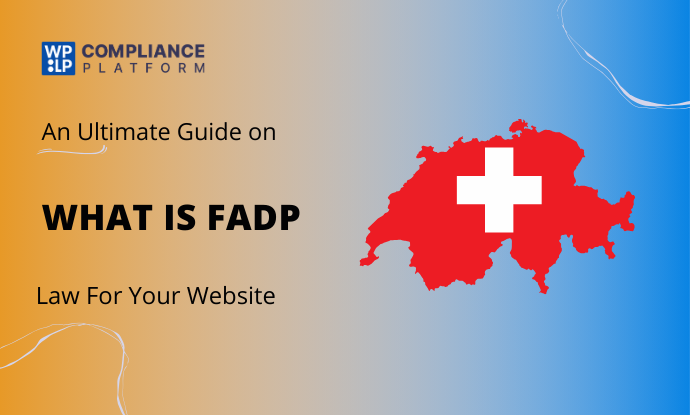Swiss Federal Act on Data Protection (FADP) – How to Comply?

Summary
Consumers have the right to access, correct, delete, and transfer their data. Non-compliance can result in fines up to CHF 250,000 and reputational damage. Tools like WP Legal Pages and WP Cookie Consent can help businesses comply with these regulations.
Ever Wondered how the Swiss Federal Act on Data Protection (FADP) law works?
Like any other privacy law worldwide, the Swiss Protection Act was approved in 2020 and FADP requirements came into effect on September 1, 2023.
In Switzerland, the Federal Act on Data Protection (FADP) is the primary law governing personal data collection, processing, and protection.
This law imposes stricter obligations on organizations that handle personal data and violate FADP privacy rules.
If you handle data or operate a business in Switzerland, understanding the FADP is crucial for ensuring compliance and avoiding penalties.
In this article, let us learn what FADP is and how to comply with the law.
What is the Swiss Federal Act on Data Protection (FADP)
The Federal Act on Data Protection (FADP) sets privacy standards in Switzerland to protect individuals’ rights and privacy. Any companies or organizations that collect, store, or process data within Switzerland must adhere to this law.
This legislation guarantees that individuals have significant control over their data, similar to the GDPR, and it applies to both Swiss companies and foreign entities that manage the data of Swiss residents.
FADP Compliance and Requirements
Under the Swiss data protection law, businesses are required to:
- Obtain consent from individuals before collecting their data.
- Protect data from unauthorized access.
- Inform users about how their data is being handled.
Why is FADP Important?
The Swiss Protection Act enforces strict regulations, and a company’s non-compliance can result in serious consequences. Following the FADP Privacy principles is essential for businesses to maintain user trust and avoid legal issues.
Thus, any organization handling personal data in Switzerland should have a solid understanding of FADP and ensure compliance with its requirements.
Switzerland Privacy Law And Effects
In other words, 80% of penalties under Swiss data protection law aim to safeguard an individual’s rights. Non-compliance attracts huge fines by Switzerland’s privacy law, notwithstanding its provisions for individual rights under the Swiss data protection law.
Compliance with the FADP privacy standards shields companies from legal risks and confers consumer confidence.
Then, it is clear that understanding Swiss Data Protection Law means that a company or group has devolved into or interacts with a Swiss user. Furthermore, compliance with the FADP asserts organizations’ ability to fulfill regulatory expectations and maintain data privacy integrity according to international standards.
Who Must Comply With the Swiss Protection Act?
According to the FADP, any person or entity processing the personal data of a person residing in Switzerland must submit and comply with specific mandatory regulations. Those include organizations within Switzerland and those outside it that carry out data-handling activities concerning Swiss citizens.
In this regard, the FADP applies to private individuals, companies, and federal bodies that process personal data within Switzerland.
Essential requirements for compliance with the provisions of the FADP are as follows:
- The data subject’s location: The location determines the legality of the FADP operation on the processed personal data.
- Extraterritorial reach: If a company processes data of Swiss citizens, it must comply with the FADP, irrespective of its establishment in Switzerland.
- All sectors are concerned: Sectors concern all businesses that deal with Swiss nationals’ data, operate retail, provide social media services, control healthcare, and act in the financial field.
What are the Consumer Rights Under FADP Law
Individuals who are concerned about personal data have certain rights under Switzerland’s Federal Data Protection Act. These rights restrict and define the manner of use and spread of data regarding the person.
1. Information Rights
People have the right to learn from the organization what types of personal information it collects and processes. This includes:
- Who processes their data
- Which data will be recorded
- Why it will be used
- How long it will be archived
- To whom it will be shared
Without excessive effort, the organization would have to supply that information to a person free of charge within 30 days.
Health data must be consented to by the user, and a healthcare professional can provide the information. Media organizations can deny access to information if disclosure harms journalistic practices or threatens the confidentiality of sources.
2. Rights of Access
When a person processes personal data automatically through a contract or consent, they can obtain it in a commonly used electronic format.
3. Data Portability
The person can request to transfer their data to another service provider without charge unless an exception applies. However, portability rights may be denied for privacy issues, legal impediments, or security measures.
4. Right to Alter Information
The person can request the correction of erroneous personal data; however, the organization may deny the request for the following reasons:
- The law prevents amendments to the data.
- The organization retains it under the Public Interest Exception for archival purposes.
5. Right to deletion of data
A person may seek data deletion when the organization’s data processing deviates from the FADP’s privacy rules.
6. Rights of Opposition
People may object to the sharing of their data, except for that scenario where an organization could reasonably deny the objection:
- They need to share the data for legal purposes and
- Sharing data would interfere with their trade obligations.
7. Rights to Automated Decisions
If an important decision about a person is achieved by an automated decision-making system (like AI), that person is entitled to:
- Be informed about that decision;
- Present his or her views;
- Seek a human assessment of that decision.
The decision does not apply if made under a contract with the person or if the person has agreed to the decision regarding the automated process.
How Businesses Can Comply With FADP Regulations
The FADP law of Switzerland requires businesses to secure user data while obeying strict privacy criteria. To comply with FADP, companies should clearly explain their privacy policy, obtain user consent, and delegate control over their data to users.
WordPress website owners can comply with this Swiss data protection law without fuss with all available tools, such as WP Legal Pages and WP Cookie Consent.
1. Draft FADP-Related Privacy Policy
A cleanly constructed privacy policy is a must under Swiss privacy law. It must disclose:
- How personal data is collected and used
- Where the data is stored and how long it is retained
- Users’ rights under the Swiss data protection law
Using WP Legal Pages, generate a fully compliant and up-to-date professional privacy policy based on FADP requirements, protecting your business and its interests.

2. Enable Cookie Consent Banner
The FADP data privacy laws require businesses to seek consent from users before storing cookies on their systems. The WP Cookie Consent plugin can help companies set up a cookie consent banner, keep visitors informed about tracking technologies, and manage their preferences.

Data Access, Correction, and Deletion Requests Facilities
Users have the right to:
- Access their personal data (*Right to Access*)
- Correct any inaccurate information (*Right to Correct*)
- Request that their data be deleted (*Right to Delete*)
With the help of WP Legal Pages, you can easily add legally required pages for user data requests.
3. Security in Data Processing
Swiss data protection law also enjoins businesses to impose security measures, including access controls and encryption, to prevent unauthorized access to data.
FADP Penalties and Fines for Non-Compliance
Businesses that fail to comply with Swiss data protection law (FADP) can face serious consequences:
- Financial Penalties: Companies may be fined up to CHF 250,000. In some cases, individuals responsible for the violation, such as executives or data controllers, may be held personally liable and fined.
- Legal Action: Authorities can take legal action against non-compliant businesses, leading to costly investigations and corrective measures.
- Data Breach Consequences: If a data breach occurs due to non-compliance, businesses must notify affected individuals and report the breach. This can result in further penalties and reputational damage.
- Reputation Damage: Non-compliance with Swiss privacy law can harm a business’s reputation, reduce consumer trust, and affect its profits.
FAQ
The FADP (Federal Act on Data Protection) is Switzerland’s law that regulates how personal data is collected, processed, and stored to protect privacy.
The FADP law applies to all organizations, both inside and outside Switzerland, that process the personal data of Swiss residents.
Non-compliance with the FADP law can result in fines of up to CHF 250,000, legal actions, and reputational damage.
Businesses can comply with FADP by ensuring transparency, obtaining consent, securing data, and allowing users to access, correct, and delete their data.
Conclusion
The revised Swiss Federal Act on Data Protection significantly changes business obligations, aligning it with the GDPR.
The law now applies beyond Switzerland, protects all individuals, and includes biometric and genetic data as sensitive information.
Foreign controllers or processors must appoint a Swiss representative, and individuals gain broader rights over their data.
Easily update your privacy policy to comply with the Swiss FADP using WP Legal Pages Policy Generator.
If you like this article, you might also like:
- How to Create a WordPress Privacy Policy for Your Website
- How to Create a Privacy Policy For Landing Pages
- What is Privacy Statement and How to Create One?
Are you looking to create a privacy policy for your website? Grab the WP Legal Pages Policy Generator for easy operations!
